Sixties
City presents
a wide-ranging series of
articles on all aspects of the Sixties, penned by the creator of the iconic
60s music paper Mersey
Beat
|
Sixties
City presents
a wide-ranging series of
articles on all aspects of the Sixties, penned by the creator of the iconic
60s music paper Mersey
Beat
|
|||||
|
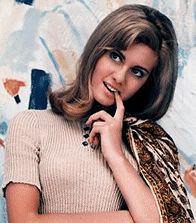 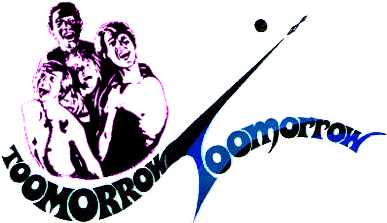 |
Harry
Saltzman, co-producer of the Bond films, arranged a meeting with director
Val Guest. Instead of being asked to direct a Bond movie, he was asked
“How would you like to make the first outer space musical?” Guest, who
had directed films such as ‘The Quatermass Xperiment’ and ‘The Day The
Earth Caught Fire’, thought he was referring to a sci-fi film, but Saltzman
said, “We have this story about a pop group who are vacuumed up by a UFO
to teach other aliens how to make music”.
Saltzman said his co-producer wouldn’t be Cubby Broccoli, who he made the Bond films with, but Don Kirshner, the American producer who’d created The Monkees. The idea was to create another hit group by starring them in a film and producing records. Guest was introduced to the four members of the newly formed Toomorrow group, Olivia Newton-John (age 21) on vocals, Karl Chambers (age 22) an American drummer, Ben Thomas (age 24), an American vocalist and former Tom Jones pianist Vic Cooper on keyboards. Saltzman had formed a new company called Sweet Music Productions, but as soon as Guest agreed to direct the movie, problems arose. The script had been penned by novelist David Benedictus, but Saltzman asked Guest to re-write it.Guest then started receiving notes from Kirshner in New York, almost daily, suggesting new story additions. After he’d worked for several weeks without the promised payments, Guest found that Sweet Music Productions was in financial trouble. Apparently, Saltzman had put up part of his share in the Bond films as collateral, but Broccoli pointed out that there could be no other partner in the James Bond Eon Productions, so no more finance was available. Guest sued, won the lawsuit, but never received his money. |
|
Although he allowed the film's premier to take place at the London Pavilion
in August 1970, he slapped a writ on the production saying that the film
couldn’t receive any more showings until he received his money, which he
never did. So, the film closed after only a week and Kirshner is said to
have distanced himself from it and wouldn’t allow it to be shown again during
his lifetime. It is believed that there is one remaining copy of the film
in private hands that was shown once in 2000 at a Los Angeles film festival.
There was a vinyl album ‘Toomorrow’ issued on RCA LSA 3008. The tracks were: ‘You’re My Baby Now’; ‘Taking Your Own Sweet Time’; ‘Toomorrow’ (instrumental); ‘Let’s Move On’; ‘Walking On Air’ (instrumental); ‘If You Can’t Be Hurt’; ‘Toomorrow’; ‘Walking On Air’; ‘Spaceport’; ‘Happiness Valley’; ‘Let’s Move On’ (instrumental); ‘Going Back.’ Two singles were also released: ‘I Could Never Live Without Your Love’ c/w/ Roll Like the River’ and ‘You’re My Baby Now’ c/w ‘Going Back.’ The film’s publicity synopsis read: John Williams is an Alphoid, disguised as a human being, who has been on Earth for thousands for years. To normal humans his present occupation as an anthropologist has attracted no undue attention. John Williams is unhappy with his work as an observer on Earth. He feels he is wasted on a planet that prays for peace and makes war to obtain it. A visit to an Alphoid space craft, hovering above the clouds, provides him with an interesting new assignment. A remarkable and powerful vibration has been discovered on Earth and become known to the Alphoid Galactic Control. Its power is curative, not destructive, and as a growing malady in space is a sterility of sound, Williams is given the job of tracking down the cause. It is not easy, but Williams eventually tracks it to a tonaliser, a weirdly-constructed amplifier, that a young music student, Vic, has built to his own specification. Vic is one of the group of four studying at the London College of Arts. They live in Chelsea where Olivia acts as ‘den mother’ and chaperone to the other three, Karl, Ben and Vic. To finance their studies they form themselves into an 'amateur' pop group called Toomorrow, but when it seems that they are making headway in their musical career with a guest appearance at a Pop Festival at the Round House, personal problems beset the quartet. Turbulent days also exist at the college when the students demand participation in the administration. The students vote for a sit-in, but this develops into a dance-in owing to Toomorrow’s musical activities. Williams offers the group facilities to rehearse in the conservatory of his Hampstead home. After one groovy session, the group are just leaving when a beam whisks them up to the Alphoid space craft. Complete with their musical instruments – and Vic’s tonaliser – Toomorow learn that their task is to educate the space people, as astral music has lost its potency. Emotion and soul is lacking in the Alphoids’ computerised music. For Toomorrow the environment is wrong – something which the Alphoids soon realise – and they allow the group to escape back to earth. |
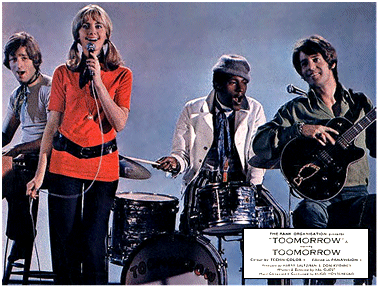 |
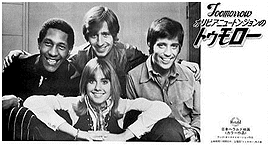 |
Matthew,
a young admirer of Olivia and leader of the Student Action Committee, is
instrumental in settling the differences between the students and the Administration
at the London College of Arts. But the agreed compromise antagonises the
staff. They decide to use the same tools as the students; they organise
a lock-out.
This proves a great embarrassment to Toomorrow. With only hours before they
are to make their important debut at the Round House, they discover their
instruments are locked inside the college. Using his masculine charm on
Dr Suzanne Gilmore, the attractive doctor of music and one of his many girl-friends,
Ben instigates the retrieval of the instruments. Time is short. A hectic car chase ensues across London to the Round House. By this time each of the group has attracted a road manager. Vic has the serious ballet student and pop convert, Amy, as his road manager. Olivia has brought along Matthew, Karl has become attracted to Sylvana. And Ben? He has several girls in tow, including Suzanne and Francoise. Even Williams has got in on the act. Johnson, a beautiful girl he has conjured from Space and brought to Earth on a mission of seduction, partners him to the Round House. It is a splendid and fitting debut. The group soon have the place grooving and swinging. The environment is ideal. It is a unique situation that the Alphoids cannot resist. The Alphoids beam Toomorrow back up to space but has this all been a dream for the members of Toomorrow? No one is sure. The film’s publicity blurb also announced: “No film with a title like ‘Toomorrow’ would be complete without a bevy of beautiful girls. Heading the futuristic glamour parade is blonde and beautiful Tracey Crisp, 25, a Londoner born and bred, who has an abundance of good looks with talent to match. |
|
She
plays Dr. Suzanne Gilmore, a prim and proper professor of music who finally
lets her hair down and removes her spectacles to revert to her natural sparkling
self in romantic scenes with Ben Thomas. Vital girl-power is also provided
by shapely Imogen Hassell, as a ballet student, and busty blonde Margaret
Nolan, sent from outer space on a mission of seduction.With-it
fashions for the girls of ‘Toomorrow’ were created by leading London costume
designer Ronald Patterson. This was Olivia’s second movie and her boyfriend
at the time, Bruce Welch of The Shadows, was to say, “The film was a disgrace.
It was reminiscent of so many of the low-budget pop pictures that were made
during the early Sixties, and the biggest let down of all was the music.
It was all so lightweight. There were no hit songs – the numbers were naïve
and instantly forgettable”. Olivia is quite glamorous in the role wearing tight shorts and mini skirts throughout. She did confess that she was asked to do one scene in her underwear, but refused and actually burst out in tears when they asked her.
|
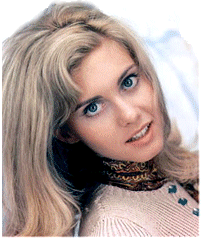
|
|
Article
Text
UK
web hosting by
|